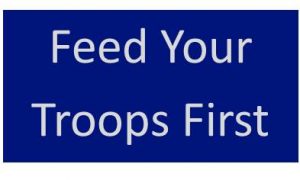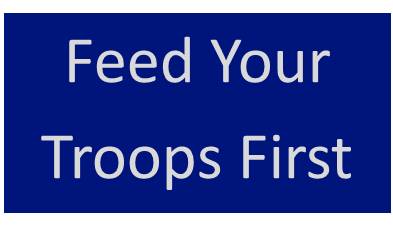 A sign in the office of a general I worked for in the Pentagon read “Feed Your Troops First.†The sign wasn’t behind the General’s desk or on a side wall where everyone could see it. Instead, he had placed it on a support pillar facing his desk where he could see it throughout the day as a constant reminder of what was obviously important to his leadership philosophy-taking care of his troops’ needs before he took care of his.
A sign in the office of a general I worked for in the Pentagon read “Feed Your Troops First.†The sign wasn’t behind the General’s desk or on a side wall where everyone could see it. Instead, he had placed it on a support pillar facing his desk where he could see it throughout the day as a constant reminder of what was obviously important to his leadership philosophy-taking care of his troops’ needs before he took care of his.
Servant leadership is certainly not a new concept. Great leaders have always known that the best way to inspire devotion in their followers is to genuinely care for them and see to their needs. All too often, however, managers get hung up on viewing people as resources and not as people. In the early stages of our leadership development classes it is common to hear students talking about their problem employees:
“So-and-so isn’t <motivated, responsible, accountable, committed, respectful…pick one>.â€
“My folks don’t want to do a good job; they just want to do the minimum…â€
Sound familiar? It always warms my heart when I hear our students transform from “They don’t…†to “How can I help them to…†It means they’ve taken that all important step towards being accountable leaders.
Managers tend to ask, “What do I need my people to do for me today?†Leaders ask, “What can I do for my people today?†and then find that they have people who want to do their very best for them. Managers say “I need more people who can do this.†Leaders say, “What have I done to ensure my people can do this?â€
Take a moment to remember what it was like as the worker-bee in this relationship. Wasn’t it better to have a boss who worked to eliminate barriers to getting the job done, who ensured you had opportunities to develop, who took the time to know you on a personal level? Of course it was.
My favorite holiday movie is White Christmas starring Bing Crosby and Danny Kaye. There’s a great line in the movie when Bob Wallace (Crosby) is explaining why the former members of the 151st Division should rally to support their former commanding officer, Major General Waverly. “We ate, then he ate; we slept, then he slept…†It’s a heartwarming film, with some great leadership lessons if you look for them. I wonder if that General in the Pentagon thought so too.
Always feed your troops first.
Until next time, be great.

Sounds good. But what happens when there is a responsibility for the employee(s) to deliver and they do not. The leader does everything they can (within their power) to remove obstacles yet the employee still isn’t productive (or isn’t consistently productive; in other words the leader must have the same discussion with the employee over again). When the leader asks the employee what they need in order to be successful the employee cannot provide an answer so how does the leader know what else they can do? I am all for feeding them first however I am having some difficulty when they reject what’s being fed to them.
Desa,
Thanks for the comment, I appreciate your feedback. You pose a great question. In fact, it’s one I hear frequently in workshops. Accountability and holding people accountable is a difficult issue for many leaders. When you find yourself having the same conversation over and over again ask yourself why you are falling into that trap. Einstein is often quoted as saying that the definition of insanity is doing the same thing over and over again and expecting a different result. Instead of having the same conversation try having a different conversation each time. A useful acronym for this from the book Crucial Accountability (Patterson et al) is CPR. This stands for Content, Pattern, and Relationship. After the first instance of a failed expectation discuss the “what” of the issue, the Content. The next time, they already know this so instead of rehashing the “what”, talk about the Pattern of failed expectations and see if that opens up more insight into why they are failing. Finally, if it happens again, it’s time to talk about the Relationship. Do they want a trusting relationship with you, with the company? Describe the relationship you want to be able to have but the poor performance is preventing it. Of course, accountability is much more complex but this might give you a start. Click on the subject “accountability” to the right of this blog page for more thoughts and articles. Especially take a look at Leadership 101: Six Ways to Help Build a Culture of Accountability. Final note: I realize that the reality of many workplaces, especially strong union shops and government organizations, make it difficult to employ the final tool of accountability (“encouraging” someone to seek employment elsewhere). I’ve got an upcoming blog post on how I handled that exact situation. So stay tuned! Thanks again for the comment, I hope this helps. – Steve